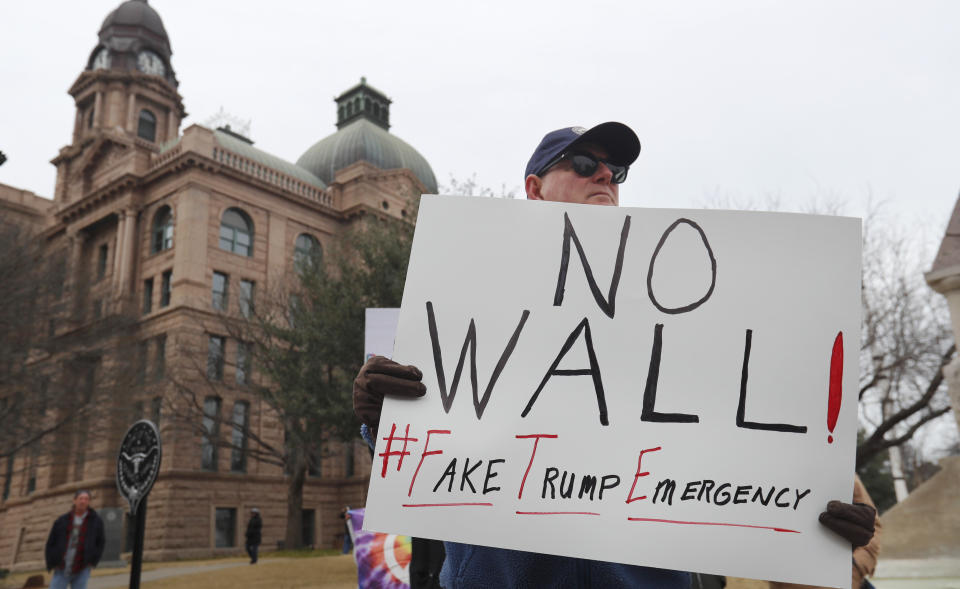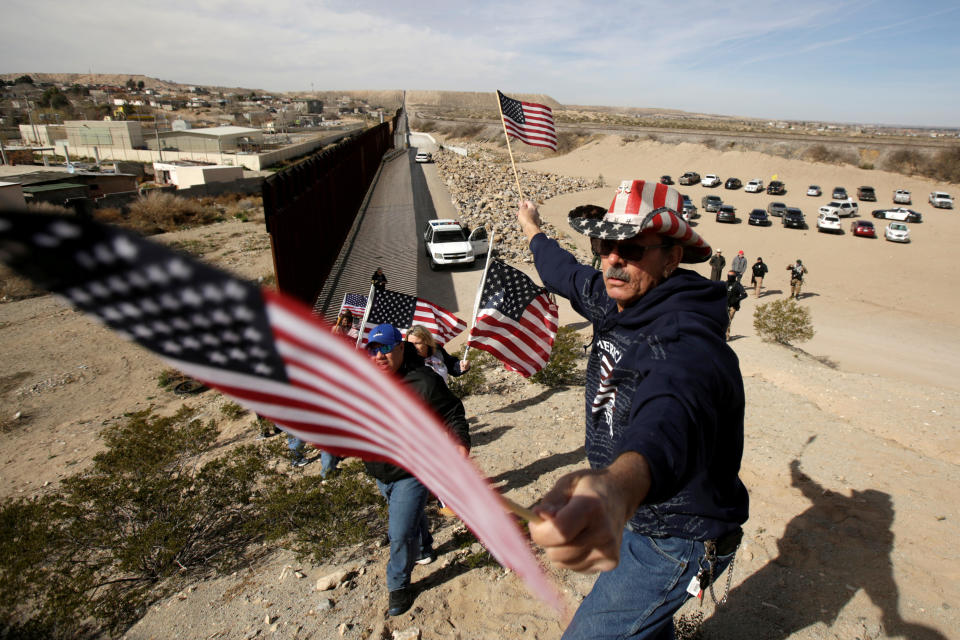How the legal fight over Trump's border wall could hurt the economy
Sixteen states that joined in the first of a string of expected lawsuits over President Donald Trump’s national emergency maneuver to fund a southern border wall could lock up nearly $7 billion in national spending if the funds come under the court’s jurisdiction.
The lawsuit filed in a federal district court for the Northern District of California seeks an injunction to stop the Trump administration from using $7 billion in federal funds already allocated to states to construct a wall along the U.S.-Mexico border.
“The diversion of funds is likely to be held up in the courts for most or all of the remainder of President Trump’s first term,” a report from Rabo Research, a Global economics and market research firm, said.
Drawn out court battles that withhold the funds from the economy, the firm said, could negatively impact GDP growth. Consumer confidence, business, and investment could be negatively impacted, as well.
‘Very hard to generate the legal case’
Whether courts will permit legal challenges at all is questionable. None of the parties that have sued the administration easily satisfy standing requirements typically required to maintain an action against the federal government over executive action.
“Unless the emergency order targets a class of people who have a right to be treated differently than they're treated under the universal declaration, it's actually very hard to generate the legal case that would challenge the emergency declaration,” Kim Lane Scheppele, professor of international affairs at Princeton University, told Yahoo Finance.

Plaintiffs must have an “injury in fact,” meaning an injury that has already occurred or is imminent, and that is not hypothetical. They also must be able to connect the alleged injury to the defendant and show that the court is capable of mitigating the injury.
The 16 states named in the California complaint allege varying injuries. Some say diverting funds away from the states causes injury to state citizens because the state can no longer use funds to stop the flow of illegal drugs and carry out separate law enforcement activities. Others say funds diverted from military projects will stymie general economic growth and, in turn, depress state tax revenues.
Whether those types of injuries are enough for the court to grant an injunctive order that and temporarily halt the use of $7 billion is anyone’s guess.
“If California says you’ve taken the funds that we’ll need for next year's fire season, it's a hypothetical injury and it's a long way off and Congress can re-top the funds,” Scheppele said. Though with courts in uncharted territory, Scheppele said they may find ways to substantiate the state’s lawsuit.
In all, the president announced $8 billion for border protection. $1.375 billion is not under immediate scrutiny because it was appropriated by Congress for border fencing. According to the administration, the remaining $7 billion could fund actual border wall construction, including $3.5 billion accessed through the emergency declaration, $2.5 billion tapped from a defense department account used to reduce the flow of illegal drugs into the U.S., and $600 million from a Treasury Department forfeiture fund used to fight crime.

The administration said it first plans to tap funds that do not rely on the emergency declaration. If courts find those funds are outside their purview it could lessen projected negative impacts on GDP.
Other potential lawsuits
In 2014, a federal district court paved the way for the U.S. House of Representatives to sue a sitting president. At the time, a district court granted House republicans standing to bring a claim against then President Barack Obama who sidestepped Congress’s power of the purse by reallocating unappropriated government funds to the Affordable Care Act.
Because The National Emergencies Act of 1976 gives the president authority to invoke national emergencies and provides a measure for Congress to remedy executive overreach, courts have been reluctant to grant Congress the right to sue under the Act.
“There’s a group called Protect Democracy that’s planning to file a lawsuit,” Scheppele said. The organization is comprised of former White House Counsel attorneys from Republican or Democratic administrations who rely on a body of informal executive branch laws handed down from previous administrations.
“Going back decades it has been a kind of secret law of the executive branch,” Scheppele said. The group, she explained, may have standing because they have a big stake in the continuity of executive office legal constraints.
Private property owners whose land the federal government would need to build border walls and fencing are another group of potential plaintiffs, though their claims would not be heard as a direct challenge to the Constitutionality of the emergency declaration itself.
‘I didn’t need to do this’
Trump may have undermined his position that drugs, human traffickers and gangs crossing into the U.S. supports a need for a national emergency declaration. While fielding a question about the declaration from an NBC, the president said, “I didn't need to do this, I wanted to get it done faster.”
Critics challenging the president’s interpretation of an emergency point to the speed with which he chose to declare it. If drugs, human trafficking and gangs were a true national emergency, they say, the action would have been invoked as soon as the president became aware of the purported crisis.
That argument, Scheppele says, might not be as potent as critics think.
“The National Emergency Act does not define an emergency in any way,” she said, explaining that under normal circumstances courts would defer from self-defining what constitutes an emergency.
Alexis Keenan is a New York-based reporter for Yahoo Finance. She previously produced live news for CNN and is a former litigation attorney. Follow her on Twitter at @alexiskweed
More from Alexis:
Weed consumers no longer ‘stoner that lives in his mom’s basement’: CEO
NYPD: Waze users who post sobriety checkpoints may be committing crimes
How legalized cannabis changed Colorado in the past five years
Legal experts disagree on whether Trump can declare 'emergency' to build his wall
